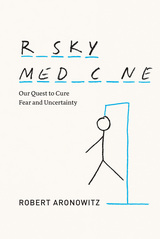
In the 1850s, "Drapetomania" was the medical term for a disease found among black slaves in the United States. The main symptom was a strange desire to run away from their masters. In earlier centuries gout was understood as a metabolic disease of the affluent, so much so that it became a badge of uppercrust honor—and a medical excuse to avoid hard work. Today, is there such a thing as mental illness, or is mental illness just a myth? Is Alzheimer's really a disease? What is menopause—a biological or a social construction?
Historically one can see that health, disease, and illness are concepts that have been ever fluid. Modern science, sociology, philosophy, even society—among other factors—constantly have these issues under microscopes, learning more, defining and redefining ever more exactly. Yet often that scrutiny, instead of leading toward hard answers, only leads to more questions. Health, Disease, and Illness brings together a sterling list of classic and contemporary thinkers to examine the history, state, and future of ever-changing "concepts" in medicine.
Divided into four parts—Historical Discussions; Characterizing Health, Disease, and Illness; Clinical Applications of Health and Disease; and Normalcy, Genetic Disease, and Enhancement: The Future of the Concepts of Health and Disease—the reader can see the evolutionary arc of medical concepts from the Greek physician Galen of Pergamum (ca. 150 ce) who proposed that "the best doctor is also a philosopher," to contemporary discussions of the genome and morality. The editors have recognized a crucial need for a deeper integration of medicine and philosophy with each other, particularly in an age of dynamically changing medical science—and what it means, medically, philosophically, to be human.

Exploring the transformation of health care over the last several decades that has led doctors to become more attentive to treating risk than treating symptoms or curing disease, Aronowitz shows how many aspects of the health system and clinical practice are now aimed at risk reduction and risk control. He argues that this transformation has been driven in part by the pharmaceutical industry, which benefits by promoting its products to the larger percentage of the population at risk for a particular illness, rather than the smaller percentage who are actually affected by it. Meanwhile, for those suffering from chronic illness, the experience of risk and disease has been conflated by medical practitioners who focus on anticipatory treatment as much if not more than on relieving suffering caused by disease. Drawing on such controversial examples as HPV vaccines, cancer screening programs, and the cancer survivorship movement, Aronowitz argues that patients and their doctors have come to believe, perilously, that far too many medical interventions are worthwhile because they promise to control our fears and reduce uncertainty.
Risky Medicine is a timely call for a skeptical response to medicine’s obsession with risk, as well as for higher standards of evidence for risk-reducing interventions and a rebalancing of health care to restore an emphasis on the actual curing of and caring for people suffering from disease.
READERS
Browse our collection.
PUBLISHERS
See BiblioVault's publisher services.
STUDENT SERVICES
Files for college accessibility offices.
UChicago Accessibility Resources
home | accessibility | search | about | contact us
BiblioVault ® 2001 - 2024
The University of Chicago Press









